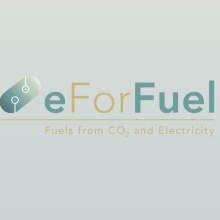University of Stuttgart is taking part in eForFuel, an exciting EU-funded research and innovation initiative that seeks to provide a sustainable replacement of fossil fuels by using electricity and microorganisms to convert CO2 into renewable fuels.
- eForFuel is a Horizon 2020 EU project launched in March 2018 and scheduled to run for the next 4 years with funding of around 4 million Euros.
- The project is led and coordinated by scientists at the Max Planck Institute (MPI) of Molecular Plant Physiology in Germany and boasts the participation of 14 industrial and academic partners from 9 European and associated countries.
- eForFuel is a truly interdisciplinary project aiming to achieve its research targets of offering sustainable alternatives to fossil fuels.
Greenhouse gases (especially CO2) emitted from the burning of fossil fuels are significant drivers of climate change and a global threat to society and the environment. Hence, it is very important to replace fossil fuels with alternative, sustainable sources. Early generation 'biofuels' compete with land resources, limit agricultural production of food, and, therefore, cannot completely replace fossil fuels without severely undermining food security and decreasing biodiversity. In order to overcome this problem, eForFuel provides a novel solution to utilize resources that are essentially unlimited and that are independent of land use: CO2, electricity and water.
"What makes eForFuel unique is the sustainable production chain that converts CO2 emissions and renewable electricity into easy to handle formic acid, which is then fed to engineered microbes for the production of renewable hydrocarbon fuels", says project coordinator Arren Bar-Even from MPI.
eForFuel aims to establish and demonstrate a unique integrated electrobioreactor, which automatically integrates CO2 electro-reduction, formate production and formate bioconversion to hydrocarbons that can serve as "drop in" fuels. This integrated system will serve as a stepping-stone towards transforming the way we produce fuels and carbon-based chemicals.
"We will develop the continuous CO2 electro-reduction into formic acid using gas diffusion electrodes with high efficiencies, activities and electrode lifetime", explains Elias Klemm from University of Stuttgart, leading scientist in the project.
University of Stuttgart from Germany will provide a key contribution to eForFuel by supplying the microbes with formic acid to ensure proton-balanced bioconversion without salt build-up in the electrobioreactor.


